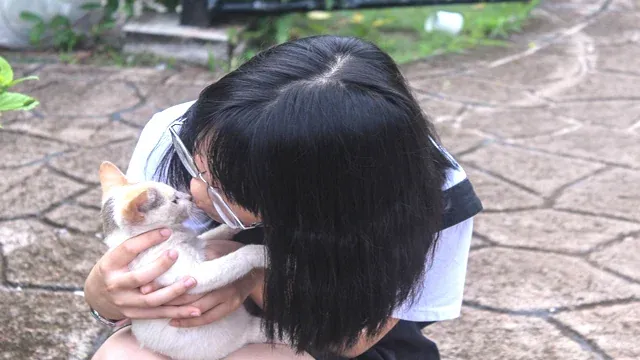Cats are fascinating creatures that often leave us wondering about their mysterious behaviors and preferences. One common question that many cat owners ponder is whether cats actually enjoy receiving kisses. While some cats might be receptive to such displays of affection, others might not share the sentiment. In this comprehensive article, we'll delve into the world of feline behavior and preferences, exploring the question, "Do cats like kisses?" We'll provide insights, tips, and expert advice to help you understand your feline friend better and strengthen your bond.
Do Cats Like Kisses?
Kissing is a human expression of affection that doesn't necessarily translate directly to the feline world. Cats have unique ways of communicating and bonding, which might not align perfectly with our human notions of kissing. However, cats do display forms of affection that are meaningful in their own language.
Cats are sensitive to touch and body language. Some cats might tolerate gentle kisses, especially if they are accustomed to close contact and have a trusting relationship with their owner. These cats might show signs of enjoyment, such as purring, kneading their paws, or leaning into the touch. On the other hand, some cats might find kisses intrusive and uncomfortable, displaying signs of stress or even trying to escape.
Reading Feline Signals: What the Body Language Says
Understanding your cat's body language is crucial in deciphering their preferences. While some cats may enjoy gentle kisses, others might feel overwhelmed or threatened by such direct and intimate contact. Here are some body language cues to watch for:
- Tail Position: A relaxed tail typically indicates contentment, while a puffed-up tail can signal discomfort or agitation.
- Ears: Forward-facing ears show interest or curiosity, while flattened ears indicate anxiety or irritation.
- Purring: Purring is often a sign of comfort and relaxation, suggesting your cat is enjoying the interaction.
- Eye Contact: Slow blinking or half-closed eyes are signs of trust and affection from your feline companion.
Exploring Feline Affection: How Cats Show Love
While traditional kisses might not be a cat's preferred form of affection, they do exhibit behaviors that demonstrate their attachment and love. Understanding these behaviors can help you build a stronger bond with your furry friend.
Head Butting: A Feline Hug
When your cat rubs their head against you, they are engaging in a behavior known as "head bunting." This is akin to a hug in the feline world. Cats have scent glands on their heads, and by head bunting, they are marking you with their scent—a clear sign of affection and ownership.
Grooming Rituals: Mutual Care
Observing cats grooming each other is a common sight. When a cat grooms you, it's a display of trust and bonding. You can reciprocate this gesture by gently brushing your cat or using a soft cloth to mimic grooming.
Playful Interactions: Bonding Through Play
Engaging in interactive play with your cat not only provides mental stimulation but also strengthens your relationship. Use toys like feather wands or laser pointers to encourage your cat to play and exercise.
FAQs
Do all cats dislike kisses?
No, not all cats dislike kisses. It varies from cat to cat based on their temperament, past experiences, and the bond they share with their owner.
How can I tell if my cat enjoys kisses?
Watch for positive body language cues like purring, kneading, and leaning in. If your cat tenses up, tries to escape, or displays signs of stress, it's best to avoid kisses.
Are there other ways to show affection to my cat?
Absolutely! Cats appreciate gentle strokes, chin rubs, and interactive play sessions. Each cat is unique, so pay attention to what they respond positively to.
Can I train my cat to like kisses?
While you can't exactly "train" a cat to like kisses, you can create a positive association by offering treats and affection when they tolerate kisses without showing stress.
Why do some cats find kisses uncomfortable?
Cats are highly sensitive to touch and smell. Kissing involves both, and some cats might feel overwhelmed by the close contact and unfamiliar scents
Should I avoid kissing stray cats?
Yes, it's advisable to avoid kissing stray cats. Strays might not be accustomed to close human contact, and it could lead to stress or defensive behavior.
Conclusion
In the realm of feline affection, understanding your cat's individual preferences is key. While traditional kisses might not be universally welcomed by all cats, they have their own language of love that they use to communicate with us. Pay attention to their cues, respect their boundaries, and focus on building a strong bond based on trust and mutual respect. Your cat will show their appreciation in their own unique and delightful ways.


